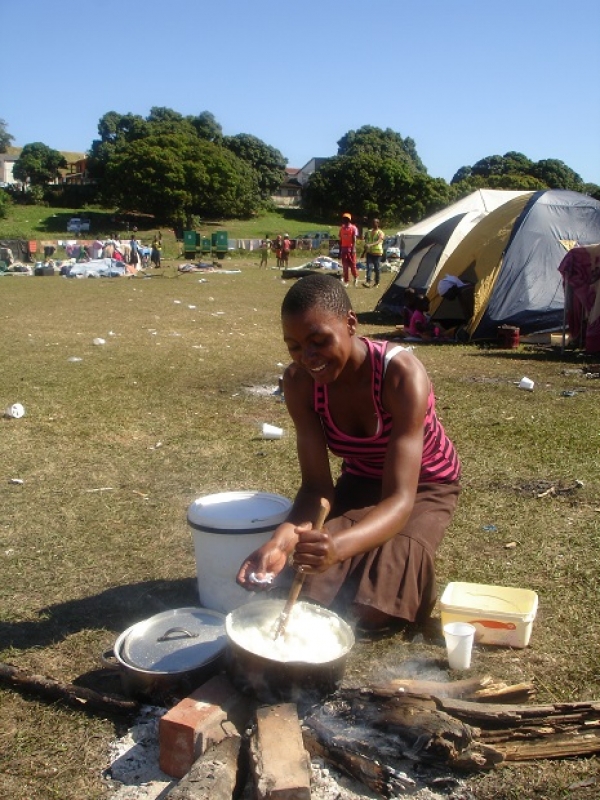“They just came to our home and slapped me”

Nowela Mukeyo, an 11-year-old Grade 5 pupil at an Isipingo primary school in Durban, calls a tent on the Isipingo football ground home.
Mowela’s mother was South African and her father was from the Democratic Republic of Congo. Both died when she was small and her uncle, who ran a small internet business in Isipingo town centre, and his family have been looking after her.
The displaced families share a few tents to sleep in and in which to keep the few belongings they managed to salvage from their homes. There is nothing resembling privacy.
The wave of xenophobic attacks happened during one of the coldest winters and blankets offered by donors have not been enough to protect them from the cold.
Mowela manages to play with other children who run around seemingly oblivious of their predicament.
“I miss my school and friends. But on the other hand I don’t want to stay in this country anymore,” she says.
Also in the Isipingo camp is Deidre Nyabenda, a 12-year-old whose parents hail from Burundi.
Deidre is a Grade 5 pupil at the local Bavumile Primary School and is fluent in IsiZulu.
She vividly remembers the day when the mobs displaced her family from the Umlazi P-section home they had been renting for a few years.
“One morning they just came to our home, hit my father and mother, and they also slapped me. They said ‘Awahambe amaKwerekwere, why are you taking our jobs? Why don’t you go to your own country?’”
“My father was injured and we barely managed to escape to the Isipingo police station where they were dozens of other foreigners like us,” she says.
She says even before the outbreak of violence her schoolmates victimised her, as a foreigner in a South African township school.
“They used to call me all the names. Others picked on me and slapped me but I endured this because my mother said I should just keep my head down,” she says.
Pamela Mpofu - who fled with her Zimbabwean parents to the Chatsworth displaced foreigners’ camp when xenophobic violence spread to the west of Durban – says she also endured a lot of prejudice from South African children.
She was a smart Grade 10 pupil at a Chatsworth high school who was also good at athletics.
“They often told me in the face that teachers loved me because I am a kwerekwere. But that was not the case. I tried to work as hard as possible and I didn’t join them when they were going with boys because my mother told me that I came here to learn. Even in athletics I excelled and represented my school and KZN province. Instead of praising me they hated me more,” she says.
Her father, Lovemore Mpofu, said he would send his two children and his wife to their home in Zimbabwe’s Gweru province, while he waits it out to see whether the situation improves for foreign nationals.
“I told my wife and the children to go so that she can see if she can get them to school. We have been uprooted so badly and all the things we have worked so hard for have been taken away from us. All that we can do is pray,” he said.
Kana Chikuru, one of the leaders at the Isipingo camp, said the Red Cross and South African authorities had promised to help counsel foreign children who had witnessed the xenophobic attacks on them and their families.
“We don’t know whether they will do this. Government had promised that they would organise a bus to take the children to their schools so that they would not miss their lessons. But nothing like that has happened to so far and we are still waiting,” he said.
Chikuru said volunteers were helping young children at the camp to teach them drawing and other skills. “It is more to keep these children from boredom that a formal education programme.”
KZN provincial education department spokesperson Muzi Mahlambi said the department was concerned about school students who were missing their education due to the xenophobic violence.
He said government was working on a comprehensive programme to integrate the displaced foreign nationals back to their homes so that the children could return to their classes.
Next: Cape Town’s strelitzia man
Previous: The way we punish

This article is licensed under a Creative Commons Attribution-NoDerivatives 4.0 International License.


